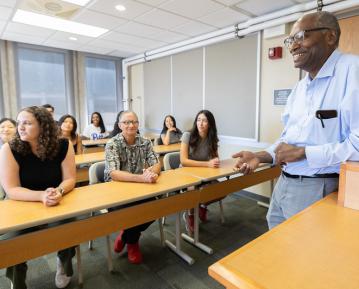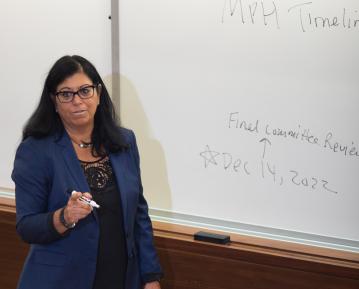Indicators on Bioinformatics Tutor You Should Know
Indicators on Bioinformatics Tutor You Should Know
Blog Article
Bioinformatics Tutor Fundamentals Explained
Table of ContentsSome Known Questions About Bioinformatics Tutor.Facts About Bioinformatics Tutor RevealedSome Of Bioinformatics TutorSome Ideas on Bioinformatics Tutor You Need To KnowBioinformatics Tutor Things To Know Before You Get This
Of the overall participants associated with the training, 80% were students from public higher education and learning establishments, while the continuing to be 20% originated from exclusive organizations. To certify for a certification of engagement, students were needed to go to a minimum of 90% of the overall training hours. As an outcome of this requirement, an excellent 95% of the individuals efficiently acquired their certifications, having not just met the minimum participation requirements yet also finished all appointed tasks throughout the training.
During the elevation of the COVID-19 pandemic, particularly between June and August 2020, the project group was charged with organizing specialized training in bioinformatics. This training was particularly targeted at pupils from the study group Center for Research in Applied Computing at the Federal University of Pará (UFRA) The adjustment to remote knowing systems due to the pandemic developed a possibility to discover new training techniques and digital tools that boosted both reach and performance.
This course was developed to provide an available yet thorough review of Artificial Knowledge techniques, particularly as used in bioinformatics (Bioinformatics Tutor). This online format made it possible for participation from trainees across Brazil, numerous of whom could not have had the opportunity to attend in-person sessions.
Not known Details About Bioinformatics Tutor
Around 50% of the total training hours were devoted to useful activities where trainees constructed smart models and applications in a variety of scientific domain names, consisting of genetics, molecular biology, and environmental data analysis. These platforms made it possible for students to involve in real-time information control, design training, and formula testing.
The training course drew in 80 individuals in total amount. Sixty of them were connected with various college organizations in the state of Pará, while the remaining twenty originated from institutions located in five various other Brazilian states. This broad geographical depiction highlighted the national rate of interest in bioinformatics and the expanding need for specialized abilities around. By introducing Artificial Intelligence in a practical and relevant context, the effort offered to connect the space in between theory and real-world application, offering pupils with a solid foundation for future study or work in the field.
The training campaign developed part of a broader scholastic outreach initiative called the Bioinformatics when driving task. This task has, over the years, presented loads of trainees to the globe of bioinformatics and computational biology. The events held under this umbrella campaign have taken area across multiple regions and years, as summed up in Table 1 (List of events, places, years, and total varieties of students and trainers)
One of the most impressive results of the Bioinformatics on the Roadway effort has been its payment to the growth of decentralized research groups. Numerous of these groups, initially united by their involvement in training occasions, have actually since gone on to generate independent scientific research in collaboration with regional scholastic establishments. The training not only cultivated clinical thinking within the context of bioinformatics however additionally triggered collective connections that expanded beyond the training he has a good point environment. These cooperations have led to enhanced regional scientific performance and added meaningfully to the growth of the broader bioinformatics area in Brazil.
The smart Trick of Bioinformatics Tutor That Nobody is Talking About
The job itself was conceptualized and arranged by megabytes and RR, that supervised the planning and execution of each step. Lectures were supplied by a multidisciplinary team containing MB, FA, EF, KP, JS, DM, SN, LP, LG, IH, a/c, and rr. The same group, excluding IH and RR, likewise worked as tutors for the functional training modules. Funding for the task was supplied with the give 88887.200562/ 2018-00 from CAPES. The authors expand their thankfulness to every person who contributed to the awareness of this task, whether directly or indirectly, given that its inception.
The Federal College of Pará's Office of Research (PROPESP/UFPA) likewise supplied financial backing, especially for the production of the final manuscript. The writers proclaim no monetary or business conflicts of rate of interest that might have affected the study. Moreover, all interpretations and viewpoints revealed in this article are entirely those of the writers and do not always mirror those of their corresponding establishments, the publisher, editors, or reviewers associated with the publication procedure.

Some Known Details About Bioinformatics Tutor
From a pedagogical viewpoint, the training method used in the training was intentionally interactive. Classes were carried out in a manner that urged pupil involvement and discussion, exceeding memorizing memorization to discover exactly how ideas are developed, used in life, and evaluated in academic settings. The educational approach concentrated on supporting both solid and having a hard time students, giving customized assistance, and building self-confidence with sustained mentorship and perseverance.

Each team, being composed of around 36 individuals, was supported by 3 coaches-- a lot of whom were postdoctoral scientists with specific experience. These advisors not only aided create the group tasks however also promoted their implementation, guaranteeing that each study concern was both appropriate and appropriately tough. The goal was to give a naturally realistic context that great post to read individuals could discover through flexible goals and accessibility to curated datasets.
For extra understandings into the technique and results of this project-based knowing strategy, visitors are routed to S1 Text, that includes thorough descriptions of the instructional framework, analysis strategies, and project styles used in the training sessions.
The 6-Minute Rule for Bioinformatics Tutor
Of the overall individuals entailed in the training, 80% were trainees from public greater education and learning institutions, discover here while the staying 20% came from personal establishments. To certify for a certificate of involvement, trainees were needed to go to at the very least 90% of the complete training hours. Notably, beyond the students who registered in the training sessions, seven skilled instructors took part in providing the programs, while three devoted research study teachers collaborated the general training procedure. Around 50% of the overall training hours were devoted to functional tasks where pupils developed intelligent models and applications in a range of scientific domains, including genes, molecular biology, and ecological information analysis. The training not only cultivated clinical reasoning within the context of bioinformatics yet also stimulated collective connections that prolonged beyond the training setting.
Report this page